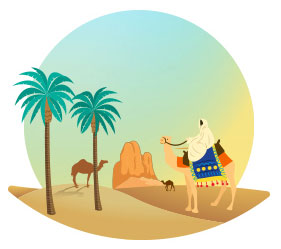Abu Quhafa Uthman Bin Aamer Al-Taymi (Sahabi)
Abu Quhafa, the Father of Abu Bakr As-Siddiq (1): Abu Quhafa, whose name was Uthman Bin Aamer Bin ‘Amr Al-Sayal Bin Kaab Bin Saad Bin Taym Bin Murrah, was from the tribe of Taym, a sub-clan of the tribe of Quraysh, and the father of Abu Bakr As-Siddiq, may Allah be pleased with them both. Abu Quhafa’s mother was Qeela Bint Adhat Bin Riyah Bin Abdullah Bin Qart Bin Razah Bin Uday Bin Kaab Bin Luayy. She was from the tribes of Quraysh and Bani ‘Adiy, the latter of which was the tribe of Al-Farooq Umar Bin Al-Khattab, may Allah be pleased with him.
Abu Quhafa was born in Makkah Al-Mukarramah in 542 AD, 83 years before the Hijrah, and grew up to be a prominent figure of the tribe of Quraysh during the Age of Ignorance (Jahiliyyah). He then embraced Islam upon the Conquest of Makkah.
During the Age of Ignorance, Abu Quhafa used to help his cousin, Abdullah Bin Jada’an, invite guests to his huge renowned banquet spread. Ibn Hisham Ibn Al-Kalbi narrated that Abdullah Bin Jada’an had two announcers, one of whom would invite people in lower Makkah, and one who would do so in upper Makkah. One of the announcers was Sufyan Bin Abdul Asad, and the other was Abu Quhafa. One of them would call: “He who wants meat and fat should come to the house of Ibn Jada’an!” while the other would call: “He who wants faludhaj (a soft honey-cake) should come to the house of Ibn Jada’an!”
In Akhbar Makkah, Al-Fakihi mentioned that Ibn Jada’an was the first to offer faludhaj in Makkah. To this, I say: That is what our Master, Ibrahim Al-Khalil, peace be upon him, used to do as well. He would tell his companions to prepare food and place it between the milk vessels and then ask some of them to announce: “Ibrahim has milked, so come!” They would then come from every direction and eat and drink and bring the leftovers back to their homes.
As stated above, Abu Quhafa embraced Islam upon the Conquest of Makkah. It has been narrated that he was brought before the Prophet, may Allah’s peace and blessings be upon him and his family, during the year of the Conquest to swear an oath of allegiance while his head and his beard were white like hyssop – a type of plant – so the Messenger of Allah, may Allah’s peace and blessings be upon him and his family, said: “Change this with something, but avoid black.” It is thus believed that Abu Quhafa was the first person in the history of Islam to dye his hair.
Abu Quhafa lived until the Caliphate of Umar, may Allah be pleased with him, and died in Makkah Al-Mukarramah in the month of Muharram, 14 AD (635 AD) at the age of 97. His son Abu Bakr As-Siddiq had passed away six months and a few days before he did, so he inherited a sixth of his wealth and gave it to the children of Abu Bakr, may Allah be pleased with him.
Abu Quhafa’s children were: Abu Bakr, Umm Farwa, and Qurayba. Regarding Umm Farwa, she married a man from Al-Azd and bore him a little girl. She then married Tamim Al-Dari Al-Lakhmi, may Allah be pleased with him. After that, she married Al-Ash’ath Bin Qais Al-Kindi, may Allah be pleased with him. As for Qurayba, she was married to Qais Bin Saad Bin Ubadah of the Khazraj tribe, may Allah be pleased with them both.
Source: Kitab Al-Sulala Al-Bakria As-Siddiqia – Part II, by Ahmed Farghal Al-De’abassi Al-Bakri
Date of Publication
1 Ramadan 1438 AH / May 26, 2017 AD
(1) Al-Isti’ab fi Ma’rifat Al-Ashab 3/ 1036, Al-Tabieen fi Ansab Al-Qurashieen 1/ 282, Akhbar Makkah, by Al-Fakihi 5/ 196, Shifa’ Al-Gharam Bi Akhbar Al-Balad Al-Haram 2/ 142, Samt Al-Nojoum Al-Awali fi Anbaa Al-Awa’il wal Tawali 1/ 243, Zubdat Al-Halb fi Tarikh Halab 1/ 8, Al-A’lam, by Al-Zarkali 4/ 206-207
